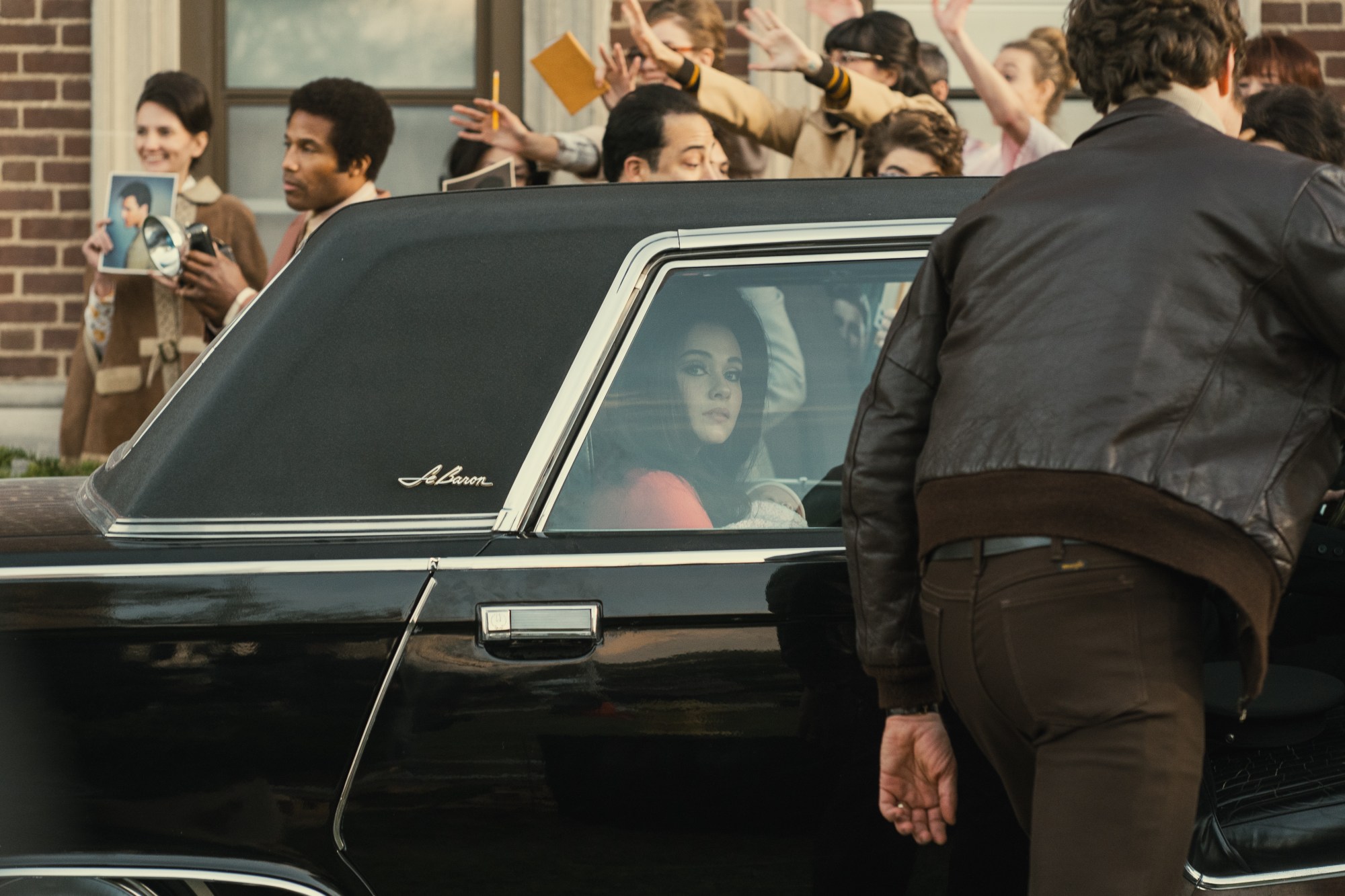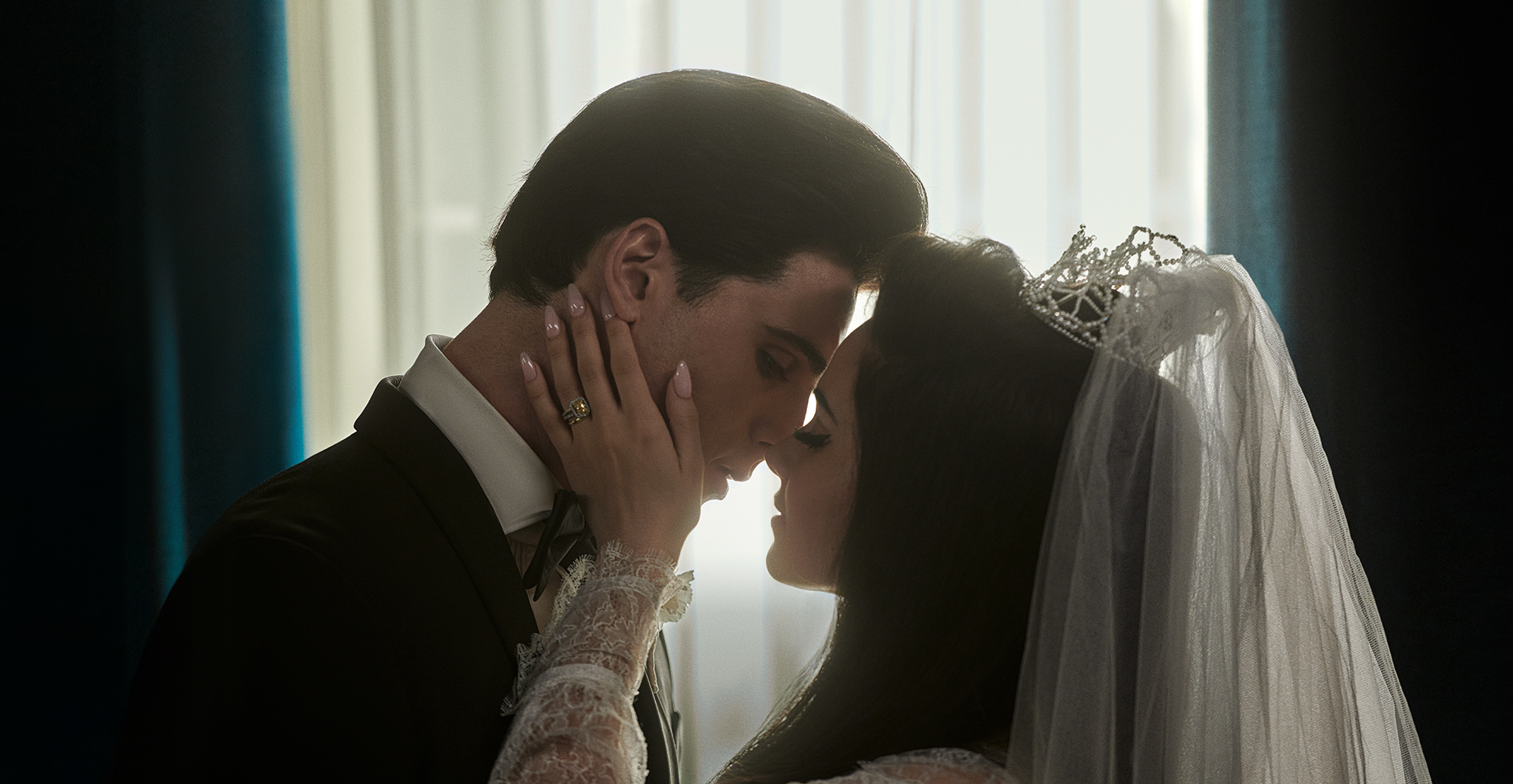In Sofia Coppola’s Priscilla, 24-year-old Elvis Presley towers over the movie’s titular character when they first meet. He’s practically twice her height. It’s 1959: a smoke-filled room in the rock-n-roll star’s military home in West Germany, surrounded by friends and female admirers. But when lonely Priscilla Beaulieu — who’s been dragged to a city nearby thanks to her father’s job in the Air Force — walks in, he summons her over. “Are you a junior? Senior?” he asks, referring to her college year. “Ninth [grade],” the 14-year-old mutters under her breath, a little captivated, a little afraid.
Barely a year has passed since Baz Luhrmann, with the permission and involvement of Elvis’ estate, made his own freewheeling biopic from the musician’s perspective. It was sickly and bright, tragic but mostly flattering. A reminder of his genius. It won Oscars and made close to $300 million dollars at the box office. Then, there is this: in essence, its antithesis. A story of the woman who lived in his shadow, who saw him as both a doting lover and a bully who kept her in a glamorous, stifling prison. In Priscilla, we only ever see Elvis in her light; a tale of how knotted the tendrils between love and pain, obsession and fear, really are.
The acknowledgement of wrongdoing swarms across the surface of Priscilla, a both ravishing and violent love story that captures the entirety of the couple’s relationship — from first meeting to their separation in 1972. We watch it bloom: their intense first rendezvous in West Germany lifts her from her humdrum home life and transforms her into the partner of one of the world’s most famous men. From her bedroom, she writes love letters to him, her handwriting curled like ribbons, before she eventually moves (thanks to a legal agreement between the Presleys and the Beaulieus) to Memphis full time. But there, the cracks of distrust and control in the relationship start to show. While Elvis performs and heads to Hollywood to shoot films, Priscilla stays at home, forbidden from having her own job or even friends. She pores over the headlines that allude to Elvis’ other women, but she isn’t permitted to visit him: Priscilla must, Elvis says, “keep the home fire burning”.

When they come together, their vast differences become more apparent. In one harrowing early scene, she comes to bed in a full face of make-up, wearing perfume. Elvis knocks back a Placidyl for insomnia, and offers Priscilla one too. She takes it and wakes up two days later, her body perfectly still and porcelain, just her pretty lashes fluttering, like the cold corpse of a Disney princess coming back to life.
Unsurprisingly, Elvis’ estate has nothing to do with Sofia’s take on the story, and as a consequence, none of his music appears in it. Instead, Priscilla herself is an executive producer on the film.
To call this a straightforward villainising of Elvis, though, is incorrect. Sofia’s work to date has almost exclusively dealt with the deftness of girlhood: not only how women feel about themselves but the myriad shades of how they feel about, and interact with, the opposite sex. Despite the fact that the most glaringly problematic element of this story is that decade-wide age gap that stretched back into Priscilla’s early teens, Sofia captures Elvis in a manner that makes it abundantly clear that he is, fundamentally, an object of lust and desire; in many ways deservedly fawned over.
It’s all down to Cailee Spaeny to make that desire feel real. The actor who, to date, has predominantly had bit parts in American popcorn movies, plays the lead role with rich and convincing strokes of frustration, hardiness and starry-eyed love. She’s so good, in fact, that the Venice Film Festival’s jury handed her the Best Actress prize. Opposite her, Jacob Elordi, laden with the pressure of the last man who played this part getting an Oscar nomination, slips into the role of an emotionally-stilted heartthrob; broken, beautiful and capable of danger. Neither are doppelgängers of the people they are playing, which in turn makes any thwarted effort to do so less of a distraction. Both are brilliant.
Priscilla is a film shot from the shadows and sidelines. Those expecting Sofia to render Elvis’ rhinestoned world may be left disappointed by the film’s almost ghostly aesthetic. The only exception is the relationship’s highs, which burst into sun-bleached moments shot on hand-held Super 8 film. Sofia has also rid her tale of most of the moments that remind you Elvis himself is famous. There’s one on-stage scene, but beyond that we remain inside of the oppressive bubble of Priscilla’s existence. Of course, it’s a major stickler in their relationship, but there’s not a single scene in the film in which we see Elvis where Priscilla isn’t also present.
This might be Sofia Coppola’s way of recentering the woman in Elvis’ life, but this is not an overly laboured, faux-feminist, ‘behind every good man’ biopic. It is brilliant, in part, because of its willingness to show the ugliness of their romantic set-up. To show that, actually, some women fall under the spells of terrible men; men who are also capable of finding ways to express their love for them, and mean it. And in the midst of this dance of adoration and anger, cynicism and unwavering faith, it seems there’s nothing to do but cling to those brief, stunning moments of infatuation.
‘Priscilla’ is in US cinemas from 27 October. It will be released in UK cinemas from 26 December. This review is from the film’s world premiere at the Venice Film Festival.


